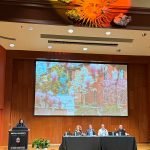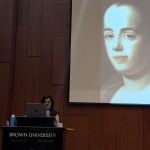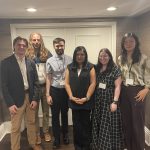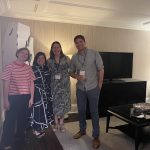Prof. Manisha Sinha was recently interviewed by the Canadian Broadcasting Corporation. Topics of discussion include President Trump and Project 2025. Open post to listen.
Uncategorized
Prof. Helen Rozwadowski’s work featured on JSTOR Daily blog
Professor Rozwadowski’s research on Arthur C. Clark and ocean exploration in the second half of the 20th century has been featured in the September 26, 2025 blog post of JSTOR Daily.
Blog post:
Arthur C. Clarke’s Scuba Adventures and Ocean Frontiers – JSTOR Daily
Article:
Arthur C. Clarke and the Limitations of the Ocean as a Frontier on JSTOR
Helen Rozwadowski to deliver University of New England’s annual Connections Lecture October 9th
Helen Rozwadowski is Professor of History and Maritime Studies at UConn’s Avery Point campus. The talk, titled “Fathoming: How History Can Help Save the Oceans” will be delivered at 12:30 p.m. in Leonard Hall on UNE’s Biddeford, ME campus. Further details can be found here.
Deirdre Cooper Owens is winner of the 2025 Carter G. Woodson Scholars Medallion
She will be presented with the medallion by the Association for the Study of African American Life and History at their 110th meeting in Atlanta later this month.
Professor Manisha Sinha featured on Massachusetts Historical Society Podcast
Professor Sinha appeared on the podcast to discuss her recent book The Rise and Fall of the Second American Republic.
Katharine Beene Successfully Defends Dissertation
On August 8th, Katharine Beene successfully defended her dissertation, “Women’s Acquisition and Transmission of Knowledge in Early Modern Ireland, 1600-1750”.
From the abstract:
This dissertation expands understandings of scientific and political advancement in Ireland from 1600-1750 by examining the often-overlooked informal learning networks of early modern Irish women, focusing on their correspondence and kinship relationships. It reveals how these women were not merely passive recipients, but active contributors to the formation and distribution of foundational knowledge in fields like medicine, science, mathematics, and politics across Western Europe. Early modern Ireland’s experience as a colony offers valuable insights into how colonial systems shape the transmission of knowledge. This dissertation argues that despite the limitations imposed by formal colonial controls on access to education, women’s informal networks played a unique role in the transfer of knowledge… Investigating women in Ireland knowledge acquisition in a kingdom-colony context provides a methodological approach to investigate informal networks and the circulation of knowledge among marginalized communities.
Congratulations to Katharine Beene on this impressive achievement!
Manisha Sinha Cited in The New York Times
Manisha Sinha was cited in a recent piece by Jamelle Bouie, which appeared in The New York Times on August 6. In the article Bouie adopts Sinha’s analogy of French republicanism, and follows her framework of different American Republics.
You can check the piece out here:
“The Death of the Fourth American Republic,” Jamelle Bouie
Alexis Dudden featured on BBC discussing Hiroshima and Nagasaki
Professor Alexis Dudden appeared on BBC World News to share insight into how the atomic bombings of Hiroshima and Nagasaki 80 years ago have affected politics in Japan and elsewhere, as well as wars since.
An Eoraip: Gaelic Ireland in Medieval and Early Modern Europe
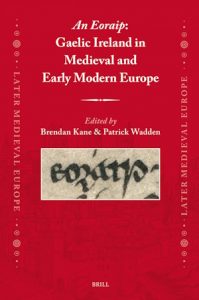 Brendan Kane and Patrick Wadden, Editors
Brendan Kane and Patrick Wadden, Editors
Medieval and early modern Irish scholars thought of themselves as Europeans. As an expression of territorial association, this belief reflects both their familiarity with the geographical traditions of Antiquity and the integration of their society into economic, cultural, and political networks that spanned the continent. But it was also an articulation of a perceived cultural affinity often denied in modern scholarship. The chapters in this volume examine the many and various ways that Gaelic Ireland was integrated into the broader, European world, focusing on literature and learning; real-world politics, economics, and travel; and questions of identity.
UConn History at Shear 2025
Over the weekend of July 17-20, the Society for Historians of the Early American Republic held their annual conference in Providence, Rhode Island, where UConn history was well-represented. Manisha Sinha, Draper Chair in American History and outgoing president of SHEAR, moderated the president’s plenary panel and delivered the presidential address, while current faculty members Cornelia Dayton, Deirdre Cooper Owens, and Melanie Newport helped to lead several panels and workshops.
Current UConn History Graduate Students Alex Keuny, Timothy Brown, and Lincoln Hirn also presented their work, as part of panel discussions. UConn History alumni Kathryn Angelica, Nathan Braccio, Nicole Breault (who also served on the program committee), Allison Horrocks, Antwain Hunter, and Amy Sopcak-Joseph all presented, as well.
